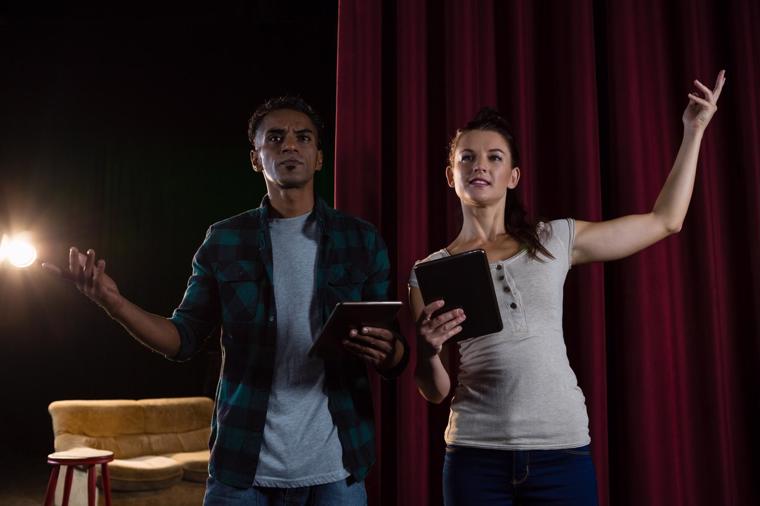The 9 Acting Tools
Essentials for Crafting Compelling Performances
(By Carmichael Phillips)
 (Photo: Cottonbro | Pexels)
(Photo: Cottonbro | Pexels)
Acting is a multidimensional art that combines talent, training, and technique. To bring a character to life on stage or screen, actors use a variety of tools to convey emotions, connect with the audience, and make their performances believable. Here are nine essential acting tools that every actor can rely on to hone their craft and create engaging performances.
1. Body Language
Body language communicates emotions, attitudes, and intentions without words. It includes posture, gestures, facial expressions, and movement. An actor’s ability to control their body language allows them to portray emotions subtly or with great intensity, adding depth to their character. Understanding and controlling body language makes the performance more visually engaging, as physical cues often speak louder than dialogue.
2. Voice

An actor’s voice is one of their most versatile tools, conveying everything from mood and personality to subtext and intent. Voice encompasses aspects like volume, pitch, tone, and clarity, all of which help shape the character’s emotions and motivations. Good voice work includes projection, articulation, and modulation, allowing actors to use their voice to reach audiences in a way that feels authentic and compelling. Proper vocal control also ensures consistency and resilience over long performances or multiple takes.
3. Emotion
Emotions are the lifeblood of acting, making characters relatable and real. An actor’s emotional range allows them to access and express feelings that resonate with the audience, from joy and love to sadness and anger. Being able to control and convey emotions at will is critical, as it draws the audience into the character’s journey. Techniques like emotional memory or substitution can help actors connect with emotions, giving authenticity to each scene.
4. Imagination
 Photo by Jonathan Crews on Unsplash
Photo by Jonathan Crews on Unsplash
Imagination is the spark that brings originality to a performance. Actors use their imagination to step into their character’s world, envisioning backstories, motivations, and unique traits that may not be in the script. This allows them to make creative choices that set their character apart, adding layers of meaning and emotional complexity to their performance. Imagination fuels spontaneity, helping actors respond dynamically to changes in the scene.
5. Concentration
Concentration helps actors stay focused and in character, despite the distractions around them. Whether on stage or set, actors must ignore external factors like cameras, crew members, and background noise to remain present in the scene. Concentration also aids in memorizing lines, cues, and movements, creating a performance that is polished and seamless. Through concentration, actors can fully inhabit the character’s mindset and immerse themselves in the world of the story.
6. Listening
Listening is a powerful tool that allows actors to engage with their scene partners and respond genuinely. Acting is not just about delivering lines; it’s about reacting to what is happening around you. Active listening enhances the spontaneity and authenticity of a scene, as actors respond to subtle changes in tone, body language, and emotion from their partners. Listening keeps the performance dynamic, as it prevents actors from merely reciting lines and instead makes them part of an ongoing, real-time conversation.
7. Observation
Observation is the practice of studying human behavior to understand and replicate it. By observing people, actors can pick up on small details like body language, vocal inflections, and emotional reactions, which they can then incorporate into their own performances. Observing real-life interactions provides a rich source of inspiration for creating nuanced characters, helping actors develop more realistic portrayals and stay true to the character’s personality and context.
8. Physicality and Movement
Physicality refers to how an actor uses their body to define a character. Movement can reveal traits like age, health, status, and personality. Some characters may walk with confidence and precision, while others might shuffle or slouch. Physicality is essential for creating a three-dimensional character and conveying the inner life of a role. Physical training, like dance, yoga, or stage combat, can help actors develop flexibility, strength, and body awareness, allowing them to bring a wider range of movement choices to each role.
9. Sense Memory
Sense memory is a technique where actors use memories of sensory experiences to evoke emotions. By recalling sights, sounds, smells, or tastes, actors can recreate the associated emotions for their character, making the performance feel genuine. Sense memory is particularly useful for scenes that require intense emotional states, as it enables actors to draw from personal experiences and connect with their character on a deeper level. This technique is central to Method Acting, helping actors bring an authentic emotional weight to each performance.
These nine acting tools—body language, voice, emotion, imagination, concentration, listening, observation, physicality, and sense memory—form the foundation of an actor’s craft. By mastering these tools, actors can create fully realized characters, engaging audiences and making each performance unforgettable.



